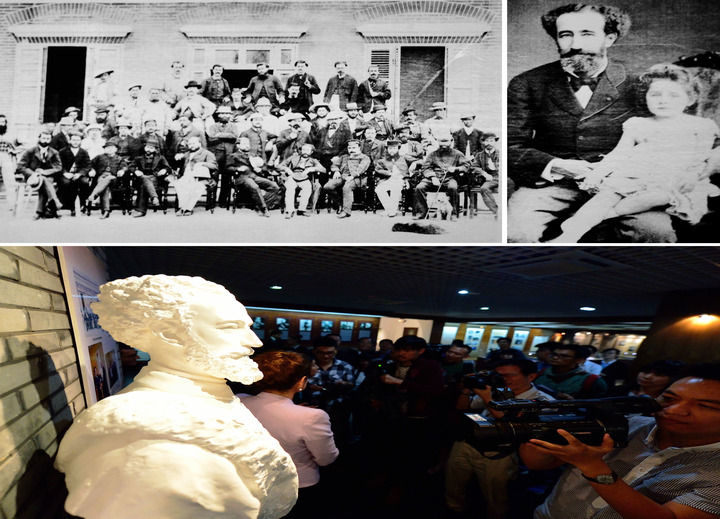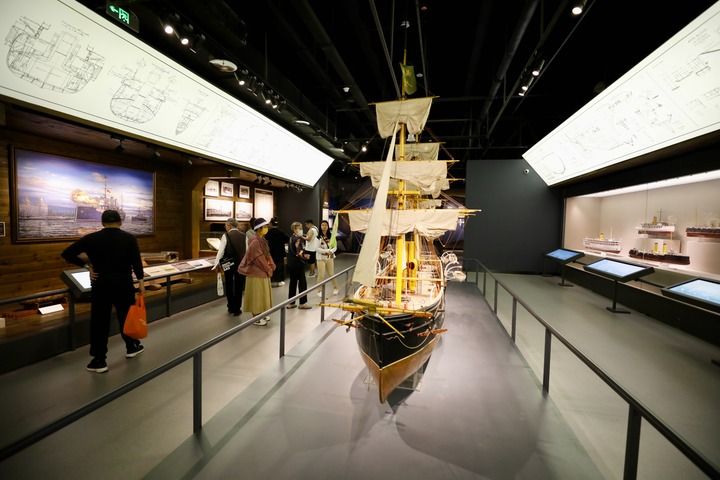In Fuzhou, Fujian Province, China, the China Museum of Ship Administration and Culture along the Majiang River records the history of the Westernization Movement to save the nation from extinction more than a hundred years ago. In the museum, among the portraits of elites of ship administration such as Yan Fu, Sa Zhenbing, Deng Shichang…a statue of a Frenchman with a high nose and deep eye is particularly eye-catching. This is the only statue of a foreigner in the museum.

The bottom picture shows the statue of the pioneer of Sino-French friendship, Giquel, photographed by media reporters (file photo); On the upper right is a photo of Giquel and his daughter (file photo); On the upper left is a photo of Giquel and the foreign teachers of the School of Ship Administration (file photo). Photographed by Wei Peiquan
On the occasion of the 50th anniversary of the establishment of diplomatic relations between China and France ten years ago, this bust of Prosper Marie Giquel was presented to the Fuzhou Municipal Government by the French Embassy in China to commemorate this Frenchman who made important contributions to the modern shipbuilding industry in China.
Born in 1835 in Laurian, a small town in northwest France, Giquel came to China as a French naval officer at the age of 22. At that time, China was in the midst of internal troubles and foreign invasion, and it was in urgent need of strengthening its coastal defense forces. Zuo Zongtang, then governor of Fujian and Zhejiang, urged Japan and Italy to promote Sino-French cooperation and help the Qing court build a naval arsenal.
In 1866, Fujian Ship Administration was established, and Giquel was hired as the official supervisor. In the following years, he supervised 15 military and commercial ships, including China’s first 1000-ton steam-powered ship “Wannianqing”.
“The ship administration broke through many technical barriers, that is, through his matchmaking, it brought western military technology and industrial technology from Europe to Mawei.” Chen Yue, president of Mawei Shipping Culture Research Association, recalled.
At that time, the exchange and mutual learning between Chinese and French civilizations was not limited to technology, but also had an important impact on the political, military, diplomatic, educational, ideological and cultural fields in modern China. One example is Fujian Ship Administration School, the first naval school in China’s modern history, which was established when Fujian Ship Administration was founded.
On May 5, on the occasion of his state visit to France, Chinese President Xi Jinping mentioned in a signed article published in the French newspaper Le Figaro that “more than 150 years ago, French people once participated in the construction of Fujian Ship Administration and Fujian Ship Administration School in China, and France was the first to accept students from China to study in France”. Giquel is the witness and firm promoter of this history.
Lin Yingyao, an expert on the history of ship administration, noticed that Giquel recorded the running of the school of ship administration in a large space when revising the historical materials of ship administration. “From the major setting, subject classification, teaching process, to the assessment of students, comments on their studies and abilities, Giquel gave guidance in every detail.” Lin said that he has made positive contributions to the training of modern talents in China.
In a report submitted to Shen Baozhen, then Minister of Ship Administration in 1873, Giquel said: If China’s naval authorities do not need these young people to serve immediately, they should send some of them to Europe for further study, which is not only beneficial to them personally, but also to the country. A few years later, Fujian Ship Administration School sent the first batch of overseas students to study in France and Britain, with Giquel as the overseas supervisor of overseas students. These students studying in China later became the first ship design engineers in modern times.
“In this batch of international students, there are also messengers of cultural exchange between China and China, such as Mr. Tcheng Ki Tong. While they went to to explore the road of saving the country through science and technology, they also realized that French culture should not rest on its laurels and go global. They are a group of elite forces in the industrialization of modern China.” Chen Yue said.
After the contract expired, Giquel planned to go to China again, but unfortunately, he died in Cannes in 1886.
This wonderful story of Sino-French friendship continues to write a new chapter after one hundred years. In the 1980s, René Viénet, a French scholar, learned about the long-forgotten history of the School of Ship Administration in France in the works of Giquel, and he has since forged an indissoluble bond with the School of Ship Administration.
“I am curious about what the ship administration school on the other side of the ocean looks like. Why does a Frenchman teach in China?” Viénet began to search and study the traces of ship administration culture in France, and finished combing the full text of Giquel’s diary. In 2006, Viénet came to Fuzhou as he wished, and was shocked by the shipyard site in Mawei District of Fuzhou today.
In 2016, the exhibition “A Frenchman’s Chinese Dream” was exhibited in the former site of the Ship Administration School. The exhibits included Fujian ship administration materials collected by Viénet from the world for 10 years. He hopes to tell people the story of a brilliant and far-sighted French youth who devoted his life to his dream and career in China in the distant 19th century.

Tourists visit the China Museum of Ship Administration and Culture in Mawei, Fuzhou (file photo).Photographed by Jiang Kehong
In the past 20 years, Viénet visited Fuzhou many times to visit the former site of ship administration. On the occasion of the 60th anniversary of the establishment of diplomatic relations between China and France, he and his descendants plan to hold an exhibition in Laurian to tell the French about the life of Giquel and his story with the ship administration.
“The cultural heritage of ship administration is an empirical evidence of Sino-French civilized exchanges and a link in the history of exchanges between the two countries. I hope that with the help of exhibitions and more civilized exchanges and mutual learning activities, the story of ship administration will be known to more people and the friendship between China and France will be passed down from generation to generation.” Liu Jiangyuan, director of Fujian Ship Administration and Culture Management Committee, said.